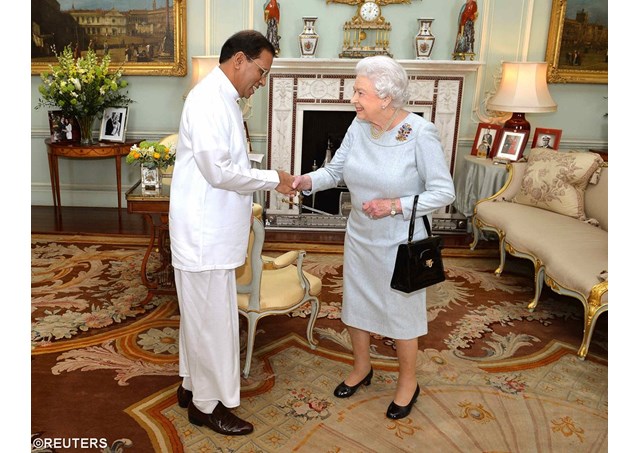
Lankan president Sirisena pledges war crimes inquiry

Sri Lanka hopes to set up a domestic inquiry within a month into atrocities from the civil war, President Maithripala Sirisena has told the BBC. He said UN investigators would not take part in the inquiry, but their views would be taken into account.
As a newly elected president, during the first papal visit to the country since the end of the war, he had promised to launch a domestic inquiry into wartime abuses, but had also pledged to protect everyone who contributed to the defeat of the Tamil Tiger separatists from international legal action.
The pope had addressed the difficulties of healing after the devastating war between government forces and the Liberation Tigers of Tamil Ealam, which ended in 2009. Sirisena, had told Pope Francis in the airport welcoming ceremony that his government aims to promote "peace and friendship among our people after overcoming a cruel terrorist conflict.”
Sirisena's predecessor Mahinda Rajapaksa consistently refused any co-operation with the UN. The army and Tamil Tiger rebels were both accused of atrocities in the 26-year war, which ended in 2009. Between 80,000 and 100,000 people are estimated to have died in the conflict. In the final months, many thousands of Tamil civilians are thought to have been killed in government shelling.
Sirisena was a cabinet minister at the end of Sri Lanka's civil war. Sirisena told BBC Sinhala's Saroj Pathirana that an investigative committee would work "efficiently, in a balanced, legal and impartial manner".
When asked if UN investigators would be involved, the president said: "We are ready to get advice and their opinions for the inquiry, but I don't think we need any outsiders because we have all the sources for this."
Charles Haviland, former BBC Colombo correspondent says “Measured in his style, Maithripala Sirisena cuts a very different figure from his controversial predecessor Mahinda Rajapaksa. On issues where Mr Rajapaksa always seemed implacable, President Sirisena appears to have opened the door just a little wider.”
So Sri Lanka will still not allow UN war crimes investigators to visit. But, said the president, "we can take account of their opinion in doing our work, to make it more fruitful". That is worlds away from the old government's position.
His National Security Council will, he said, examine details of people, mostly Tamils, who have been in detention without charge, some for years, and will report back suggesting charging them or freeing them.
He insisted there was now space for open dialogue and dissent on issues including war crimes. The UN agreed last month to delay its long-awaited report into alleged war crimes, saying the new government was more willing to co-operate than the previous administration.
Mr Sirisena came to power in January, inflicting a surprise defeat on former ally Mr Rajapaksa. Both men were in government during the bloody finale of the war, but fell out when Mr Sirisena defected.
Parliamentary elections take place later this year, and Mr Rajapaksa could return as prime minister.
Analysts say Mr Sirisena's refusal to allow UN investigators to be involved may be designed to appeal to Sinhalese voters, who are largely opposed to any international inquiry.
The Sri Lankan president met Queen Elizabeth while on his visit to Britain. Mr Sirisena also received large numbers of votes from Tamils and Muslims in January's election victory. As a result, he also has to promise to deal with the legacy of the war and promote national reconciliation.
"We expect to begin a new journey to promote reconciliation, cohabitation, brotherhood and friendship among the people of Sri Lanka, and to win over international opinion on these issues," he said.
Pope Francis when in Sri Lanka early this year, days after the unexpected ouster of wartime leader Mahinda Rajapaksa in Presidential elections, Maithripala Sirisena had pledged to hold an independent domestic inquiry into wartime rights abuses, which has ever remained a contentious topic for many among the country’s majority Sinhalese and minority Tamil communities.
The pope had urged Sri Lanka’s multiethnic, multi-religious population to promote “human dignity, respect for human rights” and the full inclusion of each member of society. On his arrival the Pope had addressed the New President and the Nation saying “Sri Lanka for many years knew the horrors of civil strife and is now seeking to consolidate peace and to heal the scars of those years, …The process of healing…needs to include the pursuit of truth….as a means of promoting justice, healing and unity.” The pope’s comment had appeared to refer to the establishment of an investigation into abuses during the war and the possibility of bringing perpetrators to justice.
The following day on January 14 the pope was at the northern jungle town of Madhu, North of the capital city of Colombo to visit the shrine of Our Lady of the Rosary, which houses a statue of Mary venerated by Sri Lankans since the 16th century. During the prayer service, Pope Francis invoked Mary, who "forgave her son's killers at the foot of the cross," saying she would guide the country to "greater reconciliation, so that the balm of God's pardon and mercy may bring true healing to all…." “May all people find here inspiration and strength to build a future of reconciliation, justice and peace for all the children of this beloved land,” he had added.
(Sources: BBC, Vatican Radio)
| All the contents on this site are copyrighted ©. |


